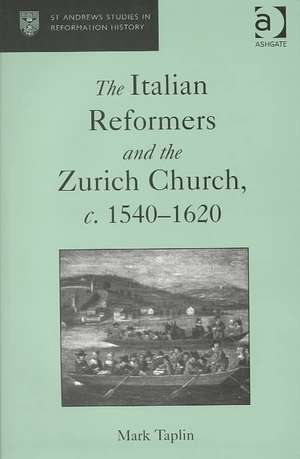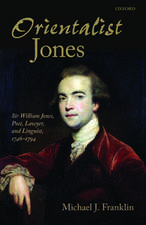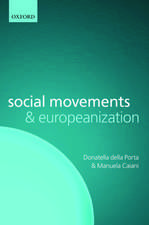The Italian Reformers and the Zurich Church, c.1540-1620: St Andrews Studies in Reformation History
Autor Mark Taplinen Limba Engleză Hardback – 28 noi 2003
Din seria St Andrews Studies in Reformation History
- 15%
 Preț: 695.67 lei
Preț: 695.67 lei -
 Preț: 311.51 lei
Preț: 311.51 lei -
 Preț: 288.80 lei
Preț: 288.80 lei -
 Preț: 313.38 lei
Preț: 313.38 lei - 23%
 Preț: 942.80 lei
Preț: 942.80 lei - 25%
 Preț: 772.07 lei
Preț: 772.07 lei - 18%
 Preț: 1054.71 lei
Preț: 1054.71 lei - 18%
 Preț: 1000.27 lei
Preț: 1000.27 lei - 28%
 Preț: 880.05 lei
Preț: 880.05 lei - 30%
 Preț: 768.30 lei
Preț: 768.30 lei - 15%
 Preț: 240.92 lei
Preț: 240.92 lei - 26%
 Preț: 822.34 lei
Preț: 822.34 lei - 18%
 Preț: 1000.27 lei
Preț: 1000.27 lei - 26%
 Preț: 765.43 lei
Preț: 765.43 lei - 25%
 Preț: 766.66 lei
Preț: 766.66 lei - 18%
 Preț: 1000.27 lei
Preț: 1000.27 lei - 25%
 Preț: 498.88 lei
Preț: 498.88 lei - 18%
 Preț: 1053.16 lei
Preț: 1053.16 lei - 25%
 Preț: 767.88 lei
Preț: 767.88 lei - 18%
 Preț: 1054.71 lei
Preț: 1054.71 lei - 26%
 Preț: 764.87 lei
Preț: 764.87 lei - 18%
 Preț: 1062.62 lei
Preț: 1062.62 lei - 18%
 Preț: 1005.01 lei
Preț: 1005.01 lei - 25%
 Preț: 768.82 lei
Preț: 768.82 lei - 26%
 Preț: 765.19 lei
Preț: 765.19 lei - 18%
 Preț: 1062.98 lei
Preț: 1062.98 lei - 31%
 Preț: 764.20 lei
Preț: 764.20 lei - 30%
 Preț: 769.55 lei
Preț: 769.55 lei - 25%
 Preț: 768.30 lei
Preț: 768.30 lei - 25%
 Preț: 770.31 lei
Preț: 770.31 lei -
 Preț: 349.80 lei
Preț: 349.80 lei - 26%
 Preț: 765.84 lei
Preț: 765.84 lei - 26%
 Preț: 765.84 lei
Preț: 765.84 lei - 18%
 Preț: 1004.20 lei
Preț: 1004.20 lei - 25%
 Preț: 496.94 lei
Preț: 496.94 lei - 18%
 Preț: 1001.84 lei
Preț: 1001.84 lei - 25%
 Preț: 770.62 lei
Preț: 770.62 lei - 25%
 Preț: 739.65 lei
Preț: 739.65 lei - 25%
 Preț: 772.76 lei
Preț: 772.76 lei - 31%
 Preț: 767.47 lei
Preț: 767.47 lei - 18%
 Preț: 1063.89 lei
Preț: 1063.89 lei - 18%
 Preț: 1057.09 lei
Preț: 1057.09 lei - 26%
 Preț: 765.01 lei
Preț: 765.01 lei - 31%
 Preț: 764.20 lei
Preț: 764.20 lei - 18%
 Preț: 1005.04 lei
Preț: 1005.04 lei - 25%
 Preț: 768.46 lei
Preț: 768.46 lei - 31%
 Preț: 763.39 lei
Preț: 763.39 lei -
 Preț: 376.48 lei
Preț: 376.48 lei
Preț: 1008.97 lei
Preț vechi: 1230.44 lei
-18% Nou
Puncte Express: 1513
Preț estimativ în valută:
193.07€ • 201.99$ • 160.38£
193.07€ • 201.99$ • 160.38£
Carte tipărită la comandă
Livrare economică 02-16 aprilie
Preluare comenzi: 021 569.72.76
Specificații
ISBN-13: 9780754609780
ISBN-10: 0754609782
Pagini: 382
Dimensiuni: 156 x 234 x 22 mm
Greutate: 0.7 kg
Ediția:1
Editura: Taylor & Francis
Colecția Routledge
Seria St Andrews Studies in Reformation History
Locul publicării:Oxford, United Kingdom
ISBN-10: 0754609782
Pagini: 382
Dimensiuni: 156 x 234 x 22 mm
Greutate: 0.7 kg
Ediția:1
Editura: Taylor & Francis
Colecția Routledge
Seria St Andrews Studies in Reformation History
Locul publicării:Oxford, United Kingdom
Cuprins
Contents: Introduction; Zurich and the Italian reformers to 1955; The Locarnese exiles and Zurich's Italian church; The Ochino affair and its aftermath; Defining and defending orthodoxy: the Zurich church's response to Italian religious radicalism in eastern Europe; The Zurich church and the confrontation with the Italian 'heretics' of Rhaetia, 1561-72; From heretics to martyrs: Zurich and the Italian Reformed churches of Graubünden, 1572-1620; Conclusion; Bibliography; Index.
Recenzii
'Mark Taplin's work convincingly demonstrates the significance of boh entities as encapsulated in the title. An impressive array of archival materials, equally wide-ranging primary and secondary materials, and a combination of nuanced historiographical awareness and theological acumen all contribute to making this an indispensable source.' Sixteenth Century Journal 'Mark Taplin has given us a thoroughly researched, clearly written and richly informative study that makes contributions in a number of areas: the Italian Reformation, reformed dogmatics, Zurich and Swiss church history, and Radical Reformation.' Renaissance Quarterly
Descriere
The Italian Reformers and the Zurich Church, c.1540-1620 is the first systematic study to assess the relationship between Italian speaking protestants and the Zurich Church during the period 1540-1620. It explores the attitude of the Zurich Church to the spread of Reformed religion in Italy, and whether it showed the sort of concern for the international spread of the Reformation normally associated with Geneva. In so doing, this book contributes to the on-going reassessment of Zurich's role within the wider European Reform movement.









